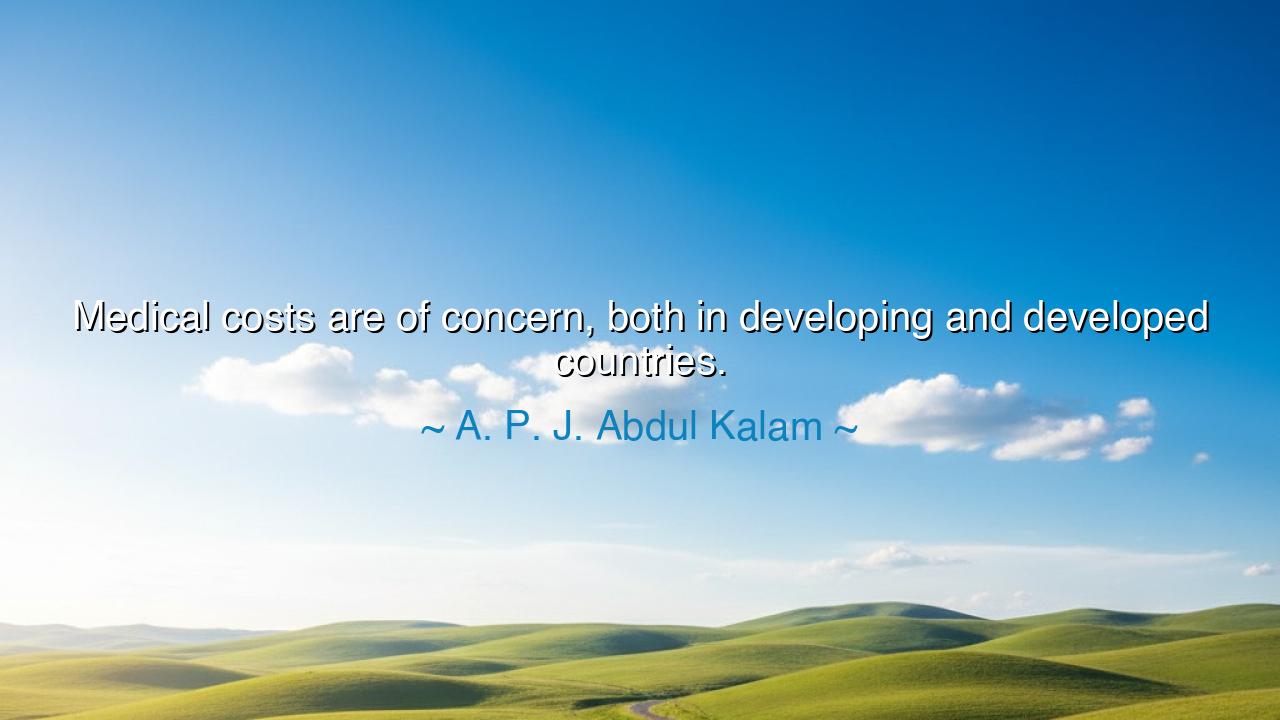
Medical costs are of concern, both in developing and developed






In the words of A. P. J. Abdul Kalam, "Medical costs are of concern, both in developing and developed countries." This statement resonates deeply in a world where healthcare, often viewed as a basic human right, has become an arena of inequality, exploitation, and unpredictability. Kalam, a visionary who dedicated his life to science, education, and the welfare of his country, highlighted the pressing issue that medical care—once a universal right—is now a growing concern for both the wealthy and the impoverished. Whether in developing nations struggling with limited resources or developed nations where costs soar, the financial burden of healthcare affects all, pushing us to question how we might achieve a just and accessible system for all people.
The ancients understood the power of health and the importance of equality in the distribution of resources. In Hippocratic medicine, the ethical principles of care were rooted in the belief that a physician’s duty was to act for the benefit of the patient, regardless of their status or wealth. Hippocrates taught that the physician must be guided by compassion and justice, ensuring that the sick received care and treatment, regardless of their ability to pay. However, even in ancient societies, the cost of medical care often left the most vulnerable unable to access the healing they needed. Kalam’s words echo this age-old challenge: that the cost of care should not limit a person’s access to their right to health, just as it did in the days of the ancients.
Consider the example of Rome during the reign of Emperor Augustus. While the Roman Empire was a beacon of technological advancement and political power, the medical system of its time was limited. Physicians were available, but their services were often reserved for the elite, with the poor unable to afford the luxury of treatment. Augustus understood that the wellbeing of his people was critical to the stability of the empire, and he attempted to make healthcare more accessible by offering public baths and rudimentary medical care to the lower classes. Yet even with his efforts, the cost of quality care remained a barrier for the majority, underscoring the ancient tension between society’s wealth and the accessibility of medical treatment.
The struggle for equitable healthcare continues to this day. Kalam’s quote speaks not only to the disparity in healthcare access between the developed and developing worlds, but also to the larger issue of economic inequality within nations. In developed countries, despite advanced medical technologies, the rising cost of care often prevents those without adequate insurance or savings from receiving proper treatment. The United States, for example, spends more on healthcare than any other nation, yet millions of citizens remain without access to essential care due to the high costs associated with both preventative and emergency services. The result is a system where quality care is a privilege for the wealthy, and a challenge for the poor. Kalam's warning calls for a system where healthcare is not dependent on the wallet, but on the inherent dignity of every individual.
In developing nations, the situation is even more dire. Many countries face not only the burden of affordability but also the lack of infrastructure, trained professionals, and life-saving medications. India, where Kalam himself made significant contributions, faces this dichotomy in healthcare. While its large cities are home to advanced medical technology, rural areas are often without even basic healthcare resources. The poor in these areas must face the additional burden of out-of-pocket costs for medicines and treatments, even when the basic infrastructure to provide them is absent. The disparity in access is a profound reminder that Kalam’s concern about the cost of healthcare is not just a financial issue—it is a human rights issue.
The lesson we take from Kalam’s words is one of urgent action and awareness. To allow healthcare costs to continue escalating is to perpetuate a cycle of inequality—where the wealthiest receive the best care, while the most vulnerable are denied the healing they need. Kalam calls for a system that treats the sick as more than numbers or profits, but as human beings with inherent dignity. In our own lives, we can act by supporting policies that advocate for affordable healthcare and universal access. We must also examine how we, as individuals, view healthcare—do we see it as a right for all people, or as a privilege for only a select few?
In practical terms, we must take steps toward equity and justice in the healthcare systems around the world. Whether by advocating for universal healthcare, supporting public health initiatives, or raising awareness about the injustices in medical access, we can all work toward creating a more equitable system where the cost of care is not a barrier to health. The wisdom of the ancients and the clarity of Kalam’s vision guide us in this pursuit. Just as the ancient philosophers taught the importance of balance and justice, we too must ensure that healthcare serves all people—regardless of their wealth, status, or place of birth. Only then will we achieve a world where health is not a luxury, but a shared right for all.






AAdministratorAdministrator
Welcome, honored guests. Please leave a comment, we will respond soon